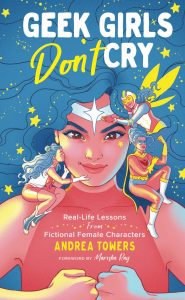 Geek Girls Don’t Cry
Geek Girls Don’t Cry
Author: Andrea Towers
Forward By: Marisha Rey
Cover Artist: Paulina Ganucheau
Publisher: Sterling Publishing
Quick! Name three fictional characters with whom you identify. Now consider: what do they have in common? In Andrea Towers‘ debut book, Geek Girls Don’t Cry, she explores connecting threads between some of the most iconic female characters in fiction. From Diana of Themyscira to General Leia Organa to Barbara Gordon to Hermione Granger to Ellie from The Last of Us, Towers examines the various traumas that force these women to build their emotional, mental and physical strength to push forward in the face of overwhelming trauma. She also talks to real women about their own relationships to fictional characters and interviews mental health experts about the potential impacts of these characters’ experiences, as well as how those ripples manifest in their stories.
Geek Girls Don’t Cry is as much a history as it is a confessional, not just for Towers but for the real-life women she interviews, including Kelly Sue DeConnick and Catrina Dennis. The book is divided into sections, exploring topics like: trauma, grief, adversity, depression and isolation. Towers pulls examples from all over pop culture, including comic books, television, video games and even webseries like Critical Role. Throughout the book, Towers attempts to examine intersections of oppression, noting how marginalized people have a different relationship to mental health than those who come from privilege.
It’s clear from Towers’ character choices and discussion points that many of these women mean a lot to her personally. She writes with conviction and asks interesting questions. Thus, Geek Girls Don’t Cry feels like an important and necessary addition to pop culture and academic canon about mental health and its explorations in fiction. Unfortunately, there are sections where Towers’ writing feels almost clinical and others where the language she uses is too neutral; while reading, this reviewer wanted more meat in some of the analysis. However, Towers never assumes authority over characters whose experiences differ so drastically from her own that she cannot provide personal commentary. She stays in her lane while acknowledging their importance in this discussion, which is admirable.
Think back to the question at the start of this review. When you identify with a character, how does it make you feel? Why is it important to you? And if people mock you or question you for that emotional connection, what do you do? Towers asks these questions and more. She also examines why we are considered invalid when we connect with or defend female characters.
“After all, how is identifying with Katniss Everdeen or Wonder Woman different than identifying with a historical figure or author or athlete?” she writes. “More importantly—why are the struggles of these characters swept under the rug? … [I]t’s easy for us to look at men and understand, on the surface, where their issues come from—especially if, like Batman and Superman and Spider-Man, they’ve been part of our pop culture narrative for decades. But we rarely stop to consider how women deal with concerns like loss and tragedy and depression, because they’re so often seen as footnotes in our stories.”
In Geek Girls Don’t Cry, Towers centers women and their stories. She explores the importance of seeing ourselves represented in fiction. She even explores these characters’ coping mechanisms and encourages readers to find healthy routines that work for them, whether they have the benefit of professional, therapeutic help or not. Geek Girls Don’t Cry isn’t a self-help book, but it will definitely help someone. It may even help you.
Final Verdict: BUY! Geek Girls Don’t Cry is definitely worth a read. It would also make an excellent book club book because of the conversation it inspires. But don’t take my word for it; grab a copy and see for yourself!
Geek Girls Don’t Cry hits shelves April 2, 2019. You can pre-order it through Amazon or IndieBound. To keep up with Andrea Towers, follow her on Twitter and Instagram.



 Geek Girls Don’t Cry
Geek Girls Don’t Cry




Comments are closed.